ISQI Seemingly Issues Final Warning to Local Carmakers
asre Khodro - Production of vehicles that fail to comply with the ۸۳ automotive standards will be halted by the end of ۲۰۱۸, says the director of Iran Standard and Quality Inspection Company (ISQI).
يکشنبه ۰۷ خرداد ۱۳۹۶ - ۱۲:۱۰:۰۰
Reporting "Asre Khodro", Most cars produced by the two major companies have engines that are no more in use in most countries with strict environmental rules. They are notorious for high emissions, poor mileage and flaunting safety rules, especially the low-priced sedans.
Nayereh Piroozbakht said, “ISQI and Iran’s Automotive Policymaking Council have devised new automotive standards and given a two-year ultimatum to automakers to comply with the standards,” local automotive website Persian Khodro reported.
“Automotive standards have been upgraded and now include 31 new regulations. The council recently mandated that all automakers should modernize production platforms and replace old assembly lines that comply with the new upgraded standards,” she added.
In case a car “fails to comply with the standards by January 2019, its production will be halted,” she warned.
In response to a question on the enforcement of the new rules, she said, “The council has legal authority to enforce the mandate and shut down production line that will be substandard.”
The move is bound to rekindle the feud between ISQI and state-owned automaker SAIPA which produces a range of low-quality vehicles based on the 25-year-old Kia Pride model.
Earlier in April, the managing director of SAIPA dismissed public comments by the ISQI chief about outdated cars and the need to ban their production – a call often made by independent auto experts and respected environmentalists.
In her comments, Piroozbakht was referring to the low-quality SAIPA Pride and Iran Khodro’s Peugeot 405, which have never risen above one star in ISQI’s five-star ranking system.
SAIPA boss Mahdi Jamali said, “Ms. Piroozbakht is overstepping her boundaries …ISQI is simply not in a position to say whether or not a car should be produced.”
Taking a defiant tone, he said, “there is ample demand for Pride, and the company will continue to produce the model until the demand runs out.” Pride models made by the second-biggest carmaker in Iran are the cheapest cars ($6,000) in the domestic market.
Investment director of the Industrial Development and Renovation Organization of Iran (IDRO), Fardad Daliri also said, “Carmakers will not terminate profitable but unsustainable projects [like the production of Pride] unless mandatory policies and stringent rules are implemented by the state.”
But the IDRO official warned that in case the Pride and Peugeot 405 platforms do not get upgraded by March 2018, “their production will be banned. The vehicles’ body design, engine and gearbox need to change.”
Meanwhile, it seems that SAIPA and other Iranian carmakers have been able to push the deadline further. According to Piroozbakht, production lines of the outdated models have to be stopped eventually.
“Since the US-imposed sanctions were lifted, Iranian carmakers have signed joint ventures with foreign firms. The low quality cars whose production will be halted, should be replaced by vehicles produced through the JVs.”
Some of the models produced by local carmakers are light-weight and designed for urban transport. They do not suit inter-city travel, she was quoted as saying.
Safety Concerns
Using the poor quality cars for long distance travel is indeed risky. During the Nowruz (Persian new year) holiday season, when people travel in unusually large numbers, it is SAIPA’s small Pride that claims the majority of lives in road accidents.
According to the latest statistics, SAIPA produced 288,472 units of this model in the last fiscal that ended in March.
The ISQI head referred to the old British-derived automobile Paykan, the production of which was discontinued in 2005 after the government offered the manufacturer Iran Khodro cash incentives to stop its production.
Piroozbakht noted, “When Eshaq Jahangiri (vice president) headed the Ministry of Industries, Mining and Trade — in 2001-05 — halting the production line of Paykan was challenging,” but he eventually did it. The last Paykan rolled out of the factory during an official ceremony on May 15, 2005.
Source: financialtribune.com

